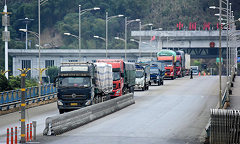Vietnam frozen goods suffer as China tightens Covid-19 inspection regime
30/11/2020 12:00

Frozen seafood and fruits shipped from Vietnam once again have difficulty in entering China as that country adopts new import policies to mitigate Covid-19 risks.
Despite China’s rising demand for frozen seafood, the tightened policies for pandemic control might delay delivery since the time needed for inspection could triple, Truong Dinh Hoe, general secretary of the Vietnam Association of Seafood Exporters and Producers (VASEP), told local media.
Vietnam exported $991 million worth of seafood to China in the first 10 months, up 1.16 percent year-on-year, according to Vietnam Customs.
Worried the pandemic could reenter through imported foods, authorities in Shanghai recently stipulated that all high-risk imported frozen foods must be taken to transit warehouses for Covid-19 testing except those sterilized at ports.
Exporters of goods to China have to provide full information about vehicle owners, vehicles, customs declaration, and goods channel.
Ngo Tuong Vy, deputy director of Chanh Thu Import-Export Limited Company, which exports fruit, said China’s measures would add to the difficulties that businesses are facing.
"Costs of frozen seafood will rise, but these goods will not be spoiled as they can be preserved at ports. Fruits meanwhile can only be preserved cold for a maximum of 20 days"
Vietnamese businesses that export dragon fruit to China are also worried since Shanghai is the main importer.
In March, China had applied similar Covid-19 inspection measures for frozen goods imported from Vietnam. In September it announced a one-week suspension of all frozen food imports from suppliers whose products test positive for the coronavirus and permanent suspension if their products test positive three times in a month.
Hoe said the Chinese government could reduce seafood import since local businesses have large inventories of whitefish and tilapia, whose exports were hit by the pandemic.
VASEP has proposed that the Ministries of Agriculture and Rural Development, Industry and Trade and Foreign Affairs should work with Chinese authorities to remove this barrier for Vietnamese businesses.
"Businesses should remain calm and not lower their prices, which will affect the overall industry. Businesses from the two nations can still negotiate, discuss and reach agreements that bring mutual benefit"
China was Vietnam’s biggest import market, accounting for 29.8 percent of its shipments, in 2019. Vietnam had exported $41.3 billion worth of agriculture and aquaculture products to China last year, a 3.2 percent increase from the previous year.
Despite China’s rising demand for frozen seafood, the tightened policies for pandemic control might delay delivery since the time needed for inspection could triple, Truong Dinh Hoe, general secretary of the Vietnam Association of Seafood Exporters and Producers (VASEP), told local media.
Vietnam exported $991 million worth of seafood to China in the first 10 months, up 1.16 percent year-on-year, according to Vietnam Customs.
Worried the pandemic could reenter through imported foods, authorities in Shanghai recently stipulated that all high-risk imported frozen foods must be taken to transit warehouses for Covid-19 testing except those sterilized at ports.
Exporters of goods to China have to provide full information about vehicle owners, vehicles, customs declaration, and goods channel.
Ngo Tuong Vy, deputy director of Chanh Thu Import-Export Limited Company, which exports fruit, said China’s measures would add to the difficulties that businesses are facing.
"Costs of frozen seafood will rise, but these goods will not be spoiled as they can be preserved at ports. Fruits meanwhile can only be preserved cold for a maximum of 20 days"
Vietnamese businesses that export dragon fruit to China are also worried since Shanghai is the main importer.
In March, China had applied similar Covid-19 inspection measures for frozen goods imported from Vietnam. In September it announced a one-week suspension of all frozen food imports from suppliers whose products test positive for the coronavirus and permanent suspension if their products test positive three times in a month.
Hoe said the Chinese government could reduce seafood import since local businesses have large inventories of whitefish and tilapia, whose exports were hit by the pandemic.
VASEP has proposed that the Ministries of Agriculture and Rural Development, Industry and Trade and Foreign Affairs should work with Chinese authorities to remove this barrier for Vietnamese businesses.
"Businesses should remain calm and not lower their prices, which will affect the overall industry. Businesses from the two nations can still negotiate, discuss and reach agreements that bring mutual benefit"
China was Vietnam’s biggest import market, accounting for 29.8 percent of its shipments, in 2019. Vietnam had exported $41.3 billion worth of agriculture and aquaculture products to China last year, a 3.2 percent increase from the previous year.
Source: VnExpress
Các tin khác
- More efforts needed to maintain export growth to China: Insiders (24/04/2024)
- Shadow trade minister calls for greater focus on removal of Chinese trade barriers (24/04/2024)
- New U.S. Solar Panel Tariff Intensifies Sino-American Green Tech War (24/04/2024)
- It is expected that there are higher orders and revenue in the second quarter from European businesses (24/04/2024)
- U.S. Ceramic Manufacturers Seeking Tariffs Against Indian Import (24/04/2024)
 Home
Home
 About Us
About Us




















